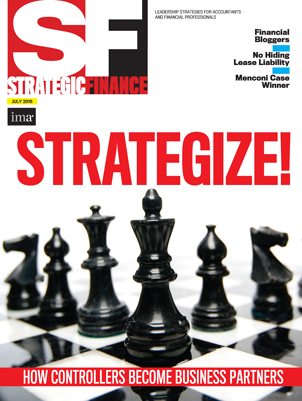I started as an analyst in the pharmaceutical industry, putting financial reports and analysis together. I was good with Excel and databases and had a good understanding of the business (products, customers, sales, and marketing strategy). I started to get involved in budgeting and forecasting early on. I was lucky enough in my career that I never had to post any journal entry. I liked accounting as a tool, the “raw material” for analytics and insights, but I preferred analysis.
I worked in Toronto for four years and was promoted to a financial planning and analysis (FP&A) function in the United States. In 2012, I earned my CMA and continued to build FP&A knowledge within my organization and to lead transformation/continuous improvement projects.
In 2015, I earned my CPA and left the industry to start consulting. I’ve been serving as Director of Academic Relations for IMA’s Dallas Fort Worth Area Chapter for more than three years, and I was also elected Young Professional of the Year in 2015.
I have met really nice people and friends through IMA. I worked with Jimmie Smith and Ron Schmidt on the CMA class review at University of Dallas (www.cmaprepcourse.com). I visited many universities with Jimmie, created a few student chapters, and was a guest speaker at the IMA Student Leadership Conference in Orlando, Fla.
I’m also still in close contact with Alan Bai, the IMA Chief Representative of China, whom I met during a trip to Beijing in 2013, and Eva Shao, the former Director of Academic Relations at the Pu Xi Chapter in Shanghai. IMA is an incredible international organization for those who want to expand their career and network. Still, even with all the networking I’ve done, I have yet to experience all the opportunities IMA has to offer, for example, in my home country, France.
The CMA is the professional certification that helps me the most in my consulting career today, providing me with depth and knowledge in FP&A that I can leverage along with the CPA’s more technical/system expertise—processes, planning, forecasting and budgeting, variance analysis, cost/volume/profit analysis, and marginal analysis.
The CMA certification sets you apart. It also carries with it a strong commitment to ethics. Earning these letters you’ve been studying hard for is an incredible achievement, and the self-discipline, courage, and respect they instill are invaluable. I’m going to continue to share this message to motivate students to pass the CMA exam and think differently about their careers in accounting.
The world is going to need more accountants with more skills. We carry three solid letters after our name, some six and more. Let’s be proud of this accomplishment and continue to engage and motivate people to follow in our footsteps.

July 2016



